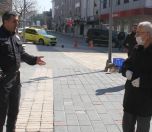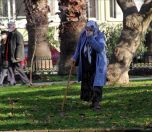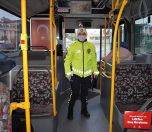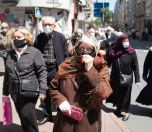* Photo: Anadolu Agency (AA)
Click to read the article in Turkish
Releasing a statement about the "blanket ban" imposed on the elderly's use of public transportation in Turkey amid the pandemic, the 65+ Elder Rights Association requests the review of this decision.
As part of the novel coronavirus (COVID-19) pandemic measures, the citizens aged over 65 and under 20 are allowed to go out at 10 a.m. - 1 p.m. and at 1 p.m. - 4 p.m. respectively. Amid debates on this restriction, a further restriction on their use of public transportation has once again become a burning issue on the country's agenda.
In a statement released by İstanbulkart, which regulates the public transport cards in the city, it was announced that as of January 15, the cards of İstanbulites would be matched with their HES codes showing their age and whether they are infected or not. It also referred to the ban imposed by the Interior Ministry on the public transport use of the young and elderly.
The 65+ Elder Rights Association has published a press release within this context and reminded the public about a woman who was aged over 65 and had to get on a bus in İstanbul because she had to work.
The association has reminded the public that following the release of the video where the woman was forced to get off the bus, though she said, "I have to work to make ends meet; I am in good health, too", several calls for solidarity and support were made for the elderly.
"However, a statement that was made two days laters has surprised us all," the association has noted and added: "In this statement, it is said, 'In compliance with the decision of the Public Health Board of the İstanbul Governor's Office, all citizens aged over 65 and under 20 have been barred from using public transportation as of January 15, 2021'."
'They work in irregular jobs'
Calling on the authorities to "review and rectify this 'blanket' ban, the reasons for which have not been announced," the 65+ Elder Rights Association has once again shared the following information about the situation and living conditions of the elderly in Turkey:
"The cliche of 'they are retired, they just sit in a corner of the house' is not valid for everyone aged 65 and over.
"According to the official figures, 12.5 percent of the 65+ population and 21 percent of the old male population work in Turkey. (TurkStat, Elderly in Statistics, 2019) The real numbers might be higher.
"Some of these people do irregular jobs. In other words, it is impossible for them to benefit from the conveniences offered to employees amid the COVID-19 restrictions. A significant number of them are self employed and shop owners; so, they have to be on their job in person. Some of them have to go out because they have to care for their old spouses or grandchildren or they have to meet their own healthcare needs.
'Elders are conscious'
"Despite this, there is a significant decrease in our elder people's use of public transportation in İstanbul. When compared to the figures in October, the number of passengers aged 60 and over dropped from 8,177,094 to 5,806,850, which marks a nearly one-third decrease. In other words, the elderly are conscious about the risk posed by the outbreak.
'There is no scientific data'
"40 percent of our elders live in households with nuclear or larger families. The members of these families work, they go out for various reasons and use public transport. In other words, they can carry the virus to their houses. That being the case, there is no scientific data about the extent to which confining 65+ individuals to their houses will reduce the infection risk.
"This is a fact that people are infected with COVID-19 mostly at home. Our Health Minister Fahrettin Koca, lastly in a statement in December, also noted that the rate of infection in houses increased to 85 percent.
"Two out of every three elderly (64 percent) live with their spouses or on their own. With the curfews imposed on them in the evening and at the weekends, the other generations' opportunity to support their relatives aged over 65 has been considerably reduced."
Emphasizing that the losses of life and serious diseases among the elders have increased for reasons other than COVID-19 as well, the 65+ Elder Rights Association has underlined that, without neglecting pandemic measures, a loosening of the restrictions based on age is possible until the first results are obtained following the vaccination for the virus.
'Trials over rights violations might increase'
"We know that the fundamental rights guaranteed by the Constitution can be restricted in the event of epidemic diseases," it has said.
"However, several legists have been stressing that these restrictions must be proportional and limited to a certain period of time, adding that restrictions and bans on the individuals aged 65 and over have overstepped these boundaries and reached the dimension of 'rights violations.'
"Poet-writer Ataol Behramoğlu and lawyer Canan Arın have appealed to Administrative Courts and filed lawsuits against these bans and requested their reversal. Such lawsuits might increase in number; it might lead to an unnecessary legal problem that would pit the state against the citizen."
Concluding its remarks, the 65+ Elder Rights Association has called on the authorities to review and reverse the ban, urging them to ask themselves what new services have been offered to the elderly and what new funds and human resources have been mobilized for this end, before imposing such restrictions and bans. (AÖ/SD)





-132.jpg)






-132.jpg)